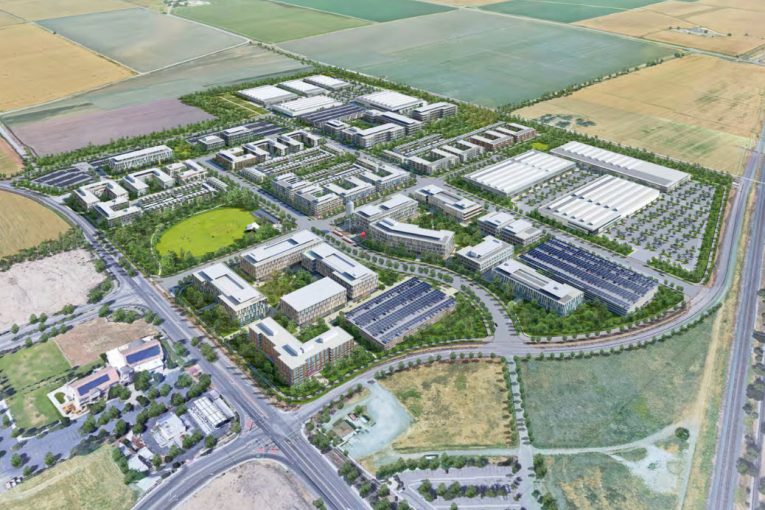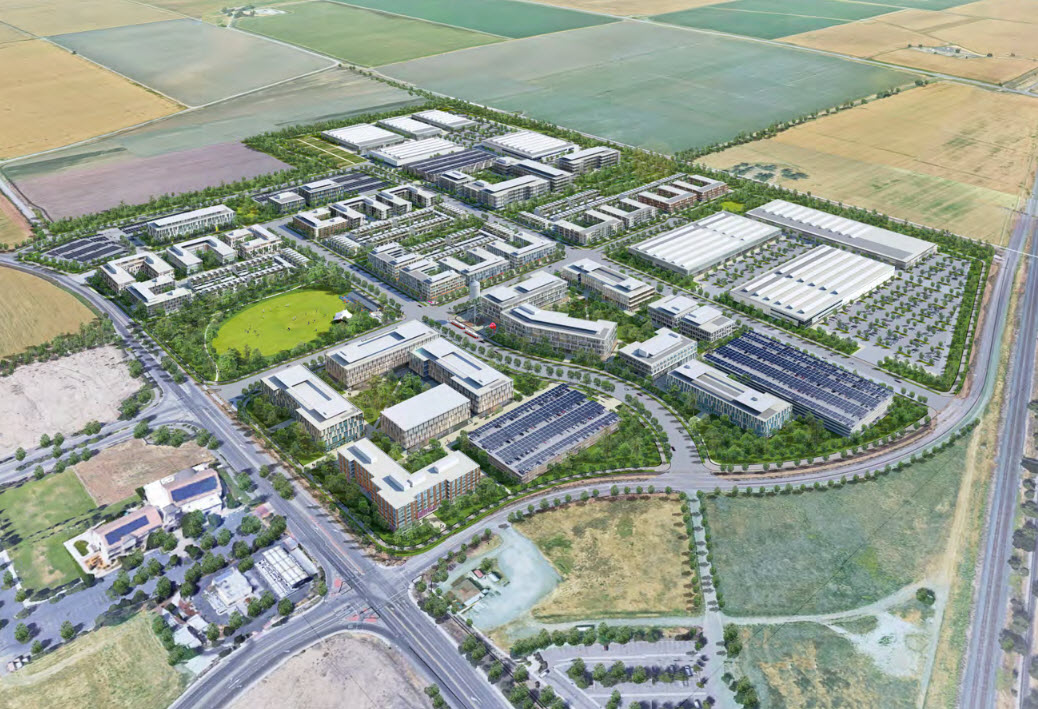

Unprecedented is probably an overused term in politics. But the local political scene this year probably fits that notion to a tee. We have district elections, we have November city council races with direct challenges, we have a presidential race that figures to draw a lot of oxygen—depending on what it actually looks like, we have the potential for simultaneous school board and city council races, we have protests continuing across the nation, and, oh yeah, throw in a global pandemic with devastating local impacts.
Into that fray throw the Measure R vote for the Davis Innovation & Sustainability Campus. In normal times, normal years, this would be the focus. Now it will be far down on the list, and that probably will work to the advantage of the proponents as I will explain shortly.
But understand how much the picture in Davis has shifted. In 2011, voters got together and massed sufficient signatures to put the water project on the ballot in a revolt against proposed rate hikes. Now, according to well placed sources, there are more than 100 people organized to launch a petition drive because they want more people of color represented on the local school board.
Bottom line is that it may be more difficult to assess the playing field now than previously.
Here is what we do know. Going into the last month, there were a lot of complaints about the DISC project from various segments in the community. The project clearly did not address all of them, but they addressed most of them.
Frankly, we did not see a ton of opposition at the Planning Commission or City Council meetings. You can argue that the positive public comments were generated or manufactured by the yes side (and they may dispute those claims) but it is hard to escape the fact that the number of people calling in to oppose the project at two separate meetings was less than 20 different individuals. And given that all they had to do was make a phone call—they didn’t have to sit at a meeting for two to three hours to make their comment, that is a strong measure.
In 2019, the issue landscape was somewhat tilted against the project. There were huge concerns about Mace Blvd. and traffic. In fact, the city still has not implemented changes to the roadway, but
 the applicants have caught a break due to COVID—traffic has at least temporarily subsided as an overriding concern.
the applicants have caught a break due to COVID—traffic has at least temporarily subsided as an overriding concern.
Critics will no doubt use this as a major thrust—and rightly so, but the problem will likely not be staring South Davis residents in the face in the four months leading up to the election. That will play in the applicants’ favor.
More than just the traffic issue, the economy figures to be a huge issue. We are facing a potentially catastrophic economic crisis, and we don’t know how bad it will get. The economy could be shut down again. The economy could further collapse if benefits end from Washington. Locally, the business community has been decimated, expected windfalls from hotels will not materialize this cycle, and this is a project that over the long term figures to have strong economic upside.
The proponents will hammer on the economy, revenue, the affordable housing component which will be the largest in the city, and the high sustainability.
The opponents will push back, probably focusing heavily on traffic and the number of parking spaces. They will gain further fodder by arguing that there is no guarantee that the people living in the housing will work on site.
One important note is that, in 2018, the tone of the opposition seemed to work against them. People were concerned about housing, and the level of anger and frustration coming from the opposition campaigns in both the spring and fall did not match voter mood.
The political landscape is even more tilted away from local anger on land use issues this year than ever before. People are worried about the President, the economy, COVID … and now the issue of race and policing has dominated the landscape for over a month and is driving local politics. In this environment, will traditional Davis-political concerns resonate anymore? It is an open question that will be interesting to examine.
It will be interesting to see where the battleground here will be fought.
One area could be on sustainability. The critics have charged that this project is in effect a dinosaur. That it is a car-centric project, it will cause huge amounts of traffic to have to commute from Sacramento and elsewhere. That the impact of 6000 cars and 24,000 vehicle trips will dwarf any sustainability on the site.
That’s where this gets tricky. There is no doubt that there will be large local impacts—especially with traffic. But globally the impact is less clear. The project itself is not going to cause there to be more people, more vehicles globally, and therefore the impact is more nuanced.
If this project is greener than the alternative then it has the capacity to actually be a net reduction in vehicle miles traveled (VMT). This is not just theoretical. The EIR analysis found that the projected average VMT for people coming to this site will be lower than the average in Davis.
Moreover, Fehr & Peers “determined that there is a sizeable number of persons residing in the Sacramento metropolitan area that commute long distances to work destinations west of Davis, including many in the Bay Area.”
Thus they find, “If the employment component of the ARC Project could induce some of these employers to relocate their operations or operate satellite work centers at the project site, many of these trips could be ‘intercepted’, resulting in considerably shortened trip distances. This would reduce the project-generated VMT and VMT per service population below the estimates presented in this analysis.”
This is a heavily nuanced argument, but it demonstrates that these issues are far from black and white.
There are also three wildcards here—two on the positive side and one on the negative.
The letter from Mabel Salon has been heavily criticized for not being strong enough—fair point. Can UC Davis come forward with a stronger commitment and one from Chancellor Gary May?
Second, will there be a major announcement about an anchor tenant? Possibly even an agreement with the university for that, which could address both of these points in one fell swoop?
That would go a long way toward allaying concerns about viability—although the worst case scenario would be the land simply lying fallow.
Finally, while the city can show pretty convincingly the lack of available commercial space, you can argue that with COVID and now what companies have learned about telecommuting, they simply do not need the office space they did a year ago?
That’s speculative of course, but can weigh in on this discussion.
At the outset, the temperature in the room suggests that, if the project were on the ballot today, it would likely pass. Concerns about the economy, the city’s finances, and affordable housing are huge drivers.
That plays to the huge advantage of the applicants at this point, because the opposition would need to rise above the din to make the points about traffic impacts and other harm—in an environment where there will be far louder noise and they are limited in their ability to go door to door.
—David M. Greenwald reporting







This is akin to suggesting that we might as well continue pursuing environmentally-harmful practices, because “someone else” will do it if we don’t. In fact, that “justification” is ultimately the reason that global efforts are so challenging to implement.
Ultimately, one can only think globally, and act locally. Even then, there are forces (as demonstrated by the Vanguard itself) that will fight tooth-and-nail to support environmentally-destructive proposals. Hypocrisy comes into play at some point, if one simultaneously claims to be concerned about local contributions to environmental problems. (I’m starting to think that this applies beyond the Vanguard, itself.)
Although this proposal could actually result in “more cars” then would otherwise exist, the more important point is that it would encourage “more driving”. Although Davis itself doesn’t actually need more jobs (to support its existing population), there are more environmentally-friendly ways to pursue economic development than a “land-use dinosaur” on peripheral land, adjacent to an already-impacted freeway.
If Davis does actually approve this, rest-assured that the next campaign will begin shortly, to build yet another peripheral housing development to support this proposal (with more cars, as well). The SEIR itself notes that this proposal does not provide enough housing to meet its own needs. And, that next campaign will also be actively supported by David and the Vanguard.
And truth be told, “someone else” (in the form of just about every town that surrounds Davis) is trying to do the same thing, but is failing. Just as the previous peripheral business park proposals failed in Davis.
That’s because there’s no actual demand for this much commercial space – even more so with Covid.
The only reason this has made it this far is because of the relative desirability of housing in Davis. But, there would never (normally) be a dense housing proposal (such as this one) so far from the city’s core.
I have to laugh at this. How many times have we been told that Davis needs to act locally even though whatever Davis does has an almost zero effect on global climate? You know, Davis can lead the way and be a model.
Keith O
Yes, Davis has led the way in the past and the world has followed. Clear examples of where Davis was either first or among the first: urban pike paths on greenbelts and streets, recycling bins (and separated materials which makes them much more valuable); building efficiency standards. Each one of these led to statewide laws, codes and regulations that delivered environmental benefits, and even carried over to national and international standards. That’s why we are pursuing more environmentally beneficial policies. We haven’t been quite so much on the leading edge of policy innovation, but we have been on the list of early adopters which encourages other localities to follow suit. Moving toward all-electric new buildings is the most current example of that.
I didn’t realize that Davis had such “influence”. A legend in its own provincial mind. That’s why Davis’ greenhouse gasses (e.g., from a 6,000-parking spot development) are so much greener than anyone else’s.
(But actually, those 6,000 parking spots wouldn’t even exist elsewhere, as there’s no commercial demand for it – beyond the phases which include housing in Davis.)
https://coolclimate.org/maps
Emissions in 95616 are well below average at 40.8 tons/capita, while emissions in 95618 are well above average at 65.8 tons/capita. This difference largely arises from many more in 95618 commuting to Sacramento, and traveling to Sac to buy goods and services.
No, Davis has been recognized nationally and worldwide for each of these efforts that I mentioned. “A global legend” would be a more appropriate moniker. (Village Homes is another globally recognized environmental accomplishment, with numerous books cataloging its features and regular visits from Japanese tourists.)
The point is that 6,000 parking spaces are going in somewhere (at least that amount). You are in total denial of the historic evidence that local policies like these are completely ineffective at controlling development at a regional and national level. Instead, we need to think globally and act to minimize global impacts through local actions. We’re fools if we think we can act like we live on an island.
Trying to respond with a put down is not a refutation of a fact. Why can’t you ever admit that your initial statement was incorrect?
No, they’re not. There is no real demand for this type of development, other than for the housing. Regardless, you’re implying that regional and state demand (for example) would be “satisfied” by this development. That is a false statement, no matter which way you look at it.
One of the commissioners (I’ve forgotten which one) noted that places such as the Bay Area have significant vacancies in their existing commercial sites. And, that was prior to Covid.
Sounds like your argument is with the president. Are you suggesting that we just abandon local efforts? (Isn’t there some kind of official policy that Davis has, regarding local contributions to greenhouse gasses?)
I’m not sure what you’re referring to, but it likely doesn’t meet those definitions.
” There is no real demand for this type of development”
First of all that’s questionable at best.
But second, you keep missing the point that people have to work somewhere. They have to get to that work. This development doesn’t create people, it moves them.
Again, you’re making a naive assertion with no supporting rationale. Aggie Square is one example of how there is regional demand for these types of projects. And I’m not saying that regional demand will be “satisfied” by this project, but rather than a portion of the demand will be met here rather than in a less environmentally beneficial location.
I don’t where you heard the Bay Area had significant commercial vacancies. I follow Bay Area business news closely for my work and I’ve only seen the opposite being said.
Why does everything have to be completely either/or with you? I said that we need to make our local policies with considerations of how they interact with global trends and realities. “Acting locally” too often has become “ignore what’s happening elsewhere” of which your statements here over the years has been the best set of examples.
This is a put down:
If you don’t recognize this as a put down, you need a look more closely at yourself.
Aggie Square is quite small, adjacent to a medical center, and is on UCD’s land.
I’d suggest finding a better example than that.
I don’t have time to respond to the rest of your comments, at the moment.
Oh yeah – that other quote was a “putdown” of some of the self-important beliefs I see regarding Davis. So, you are correct in that.
I do very much like Davis, though. That’s why I fight so hard for it.
Didn’t have time to add: Aggie Square is also being heavily-subsidized by government agencies. Kinda helps with the “viability” of it.
David G, you keep missing Ron O’s point! Davis can impose worldwide population growth control by rejecting housing and commercial developments here! How can you be so naive????
Here’s Roseville’s plan. Big enough for you?
https://www.rosevilletoday.com/news/roseville/major-development-for-roseville-rocklin-and-lincoln-moves-forward/
https://www.roseville.ca.us/UserFiles/Servers/Server_7964838/File/Government/Departments/Economic%20Development/Roseville%20Economic%20Development%20Strategy%202017-2022.pdf
And yes, basic research MUST be subsidized by the government because the spillover economic benefits can’t recovered by private entities. Huge amounts of economic research (which I’ve used for policy development work) supporting this fact.
With friends like that, who needs enemies?
The EPS analysis noted a problem, as did some of the commissioners on the city’s finance and budget commission (beyond the phases which include housing). That’s why the commission that Richard is on recommended 3,000 square feet of commercial, for each residential unit (rather than the 2,000 that was approved by the council).
They already do. This proposal will exacerbate the “housing/jobs” imbalance, which ALREADY results in a net inflow of commuters through Davis.
The question is “how” does it move them, and from “where” to “where”. (Apparently, via 24,000 car trips per day.)
The development doesn’t “create” people, but it does create a demand for more housing beyond what it provides.
(I guess I did have a little more time to respond.)
I believe that this proposal would be in the 95618 zip code.
Despite what I’ve said here about our need to realize that allowing development here instead of having it move to other less environmentally conscious communities, the COVID-19 pandemic might radically change this equation going forward. And I’m undecided about DISC for this reason. Commercial space may not be in such high demand as telecommuting becomes much more common, which will have reverberation through colocated retail and food service businesses. We may need to put a pause on such development until we develop a plan going forward that addresses these issues.
If we reject development here, in all likelihood it will happen elsewhere. To stick in your head in the sand and yell “nah, nah, nah” because you don’t want to hear this is simply silly. So the question is then what will that development look like elsewhere versus if we can control it here? If it happens in Woodland or West Sacramento, up to now those cities have not demanded as much in sustainability standards as Davis, and as a result these would be more environmentally damaging. The situation in West Sac may be changing soon with the Mayors’ Commission on Climate Change report. We saw housing development in Elk Grove, Roseville and West Sac in the last 20 years which was more environmentally damaging than if it occurred in Davis due to the Measure J/R restrictions. Even Spring Lake in Woodland is a result of this and has created more environmental problems. I’ve never bought in the “think globally, act locally” slogan because it has been twisted in exactly the way that you done.
No, it won’t.
If pursued in West Sacramento, it would likely be within the city’s already-existing, vast commercial footprint (adjacent to Sacramento, as well). Much cheaper, as well. Also, there are other areas in the region which are better-served by public transportation and proximity to existing housing. (Another commenter once posted a map, showing that the DISC site is one of the worst sites in the ENTIRE REGION, regarding attracting commuters.)
Such cities are pursuing this type of development, regardless. And so far, it appears to be failing.
Growth and development in places such as Elk Grove, Roseville, Natomas, Rancho Cordova, and West Sacramento have little to do with Davis.
Despite the provincial beliefs of some, Davis is not the “big apple” of this region. Sacramento is.
Woodland has an urban growth line, but it is far-too generous. Regardless – it already exists, and is not likely to change.
I can tell that you (and many others) have never “bought into” it. That’s why the world is in the condition that it is.
Prove it. Give us a logical argument that this statement is true. Are you saying the by saying “no” that Davis will stop national economic growth in its tracks? What a foolish, naive statement if you’re trying to claim that this is true. In fact, you’ve asserted before that the development would occur in Woodland if it’s rejected here. Which statement is true?
I’ve already provided the evidence that that development moved to other regional cities. Downtown Sac is dying because Mayor Joe Serna fought against commercial development across the river in West Sacramento, and instead that commercial space moved out to Roseville. Sac lost the opportunity for local synergy due to its shortsightedness.
A new West Sac development of this scale would likely be in Southport south of the residential developments for the same reason that Davis isn’t putting it closer to UCD–infill development is much more expensive than greenfield. That would negate the environmental benefits that you claim.
Wrong again about development in the peripheral communities. Growth controls here pushed it to the east and south of Sacramento. Davis is of the same scale as Roseville and Elk Grove, so they have similar influences on each other, with Sacramento at the center. However, Davis has a unique factor that gives it a bigger impact–its location on the main corridor with the Bay Area. That makes it particularly attractive for development if allowed. What’s your logic for your argument? Again, assertions are simply empty statements.
No, too many like you “think locally, act locally” and then try to justify their selfish behavior after the fact with ignorant statements about how these have actions have global impacts. That’s why the world is in the condition that it is in. Quit living in a fantasy.
Sure.
The Davis Innovation Center (since moved to Woodland, where it also appears to be not viable so far). Despite the addition of thousands of units of housing, as well. (Woodland housing being “not as desirable” as Davis.)
MRIC (in various guises).
The Cannery (where the owners “threatened” to leave the land lie fallow, rather than allow a commercial development – as it was already zoned for).
Nishi 1.0 (of which much of the “commercial” space was “fake”, to avoid Affordable housing requirements). (UCD then told the developers that they wouldn’t allow access through their property for commercial uses regardless – according to David.)
We can also discuss the fact that these developments are not being proposed in mass, in cities that no doubt would welcome it with open arms (being that they don’t give a damn about sprawl).
We can also go over all of the existing sites in Davis that are being converted entirely or partially to housing (if you’d like). But, I might have to catch-up on this later.
If you had been advocating for housing developments over the years while opposing commercial, your examples might have held water, but you’ve opposed all such additions universally, so your examples and reasoning are not valid here.
List examples of rejected Davis projects doesn’t prove that development didn’t happen elsewhere in the region. I can give two clear counterexamples–Southport and Spring Lake which didn’t take off until after Measure J was put in place.
Aggie Square in Sac is another counterexample on the commercial side. There are developments in Roseville as well (as I mentioned about Sac driving development there.)
So, given your (and David’s concern) regarding housing shortages, are you going to oppose this proposal due to the exacerbation of that shortage?
The very definition of a hypocrite.
Except for the problem that my concern about housing is not limited to Davis. So you are making the same mistake here as you did on the other issue (and acknowledging neither).
Housing shortages don’t occur everywhere – even in California. There’s certainly a matter of “degree”, which you’re repeatedly pointed out when it suits your political agenda.
Put this where sufficient housing already exists. There’s plenty of them, in the region. Places that actually need local jobs, as well.
Then again, there’s no actual commercial demand for this.
Regarding your arguments, you ultimately can’t talk out of both sides of your mouth – even if you’re politically skillful. You can certainly continue trying to do so, and it appears to be your stock-and-trade (e.g., to “generate” controversy). Only a few commenters have the time, interest, and energy to challenge you, regarding your views in various topics.
You’re just making stuff up at this point. Do you think this influences anyone (other than to show how aggressive you are on here)?
There’s no evidence of viability anywhere, unless it’s subsidized.
Coming from Richard, this is about as damning of a statement as you can possibly get.
At this point, the only way to put a “pause” on it is to reject it (via a Measure R vote).
I’m still trying to figure out the “logic” of those who say they might vote against a given proposal, but simultaneously don’t support Measure R. Fortunately, this form of dementia (or is it self-hatred?) seems pretty rare, on here.
In most cities, they don’t even have a Natural Resource Commission, etc., for the council to subsequently ignore. Nor do they have any remedy for that, other than the referendum process. (Which was recently used, by the way, in regard to a mixed-use proposal for Rocklin.) I believe it went down in flames.
(Correction: Loomis, not Rocklin. Basing some of this on memory.)
https://calmatters.org/commentary/nimbyism-in-suburban-sacramento/#:~:text=Loomis%E2%80%99%20long-struggling%20downtown%20could%E2%80%99ve%20gotten%20a%20shot%20in,reject%20the%20project%20in%20a%20June%20special%20election.
Given the comments on here, you’d never know that other cities also sometimes come to their senses. And boy, does it piss-off the moneyed interests.